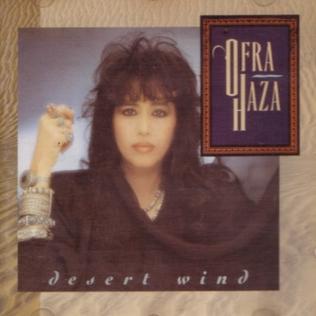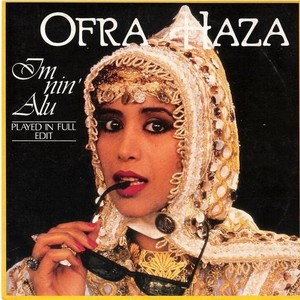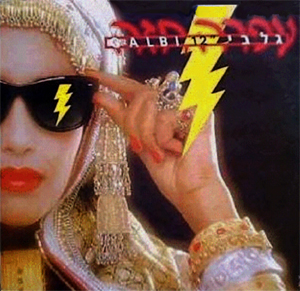
Ofra Haza was an Israeli singer, songwriter and actress, commonly known in the Western world as "the Madonna of the East", or "the Israeli Madonna". Her voice has been described as a "tender" mezzo-soprano. In 2023, Rolling Stone ranked Haza at number 186 on its list of the 200 Greatest Singers of All Time.

"Jerusalem of Gold" is an Israeli song written by Naomi Shemer. Often contrasted with the official anthem Hatikva, the original song described the Jewish people's 2,000-year longing to return to Jerusalem. Shemer added a final verse after the Six-Day War to celebrate the liberation of East Jerusalem and the ancient holy city's unification.
Zion Golan, also known as Tzion Golan, is an Israeli singer of Yemenite Jewish origin.

Achinoam Nini, known professionally as Noa (נועה), is an Israeli singer-songwriter, percussionist, poet, composer, and human rights activist working internationally. She is accompanied by guitarist Gil Dor and often plays the conga drums and percussions as she sings. Noa represented Israel at the Eurovision Song Contest 2009 together with singer Mira Awad, with the song "There Must Be Another Way". Her music is known to fuse languages and styles. She has performed in 52 countries and was the first Israeli artist to perform in the Vatican.

Desert Wind is an album by the Israeli singer Ofra Haza, released in 1989. Popular in Israel, Haza was unknown in the rest of the world until the previous year, when the song "Im Nin'Alu" and the album Shaday were released. Desert Wind was therefore more oriented toward the international market.

Izhar Ashdot is an Israeli singer-songwriter, guitarist, and record producer. He is a co-founding member of the Israeli rock band. T-Slam
Izhar is the recipient of the Israeli Copyright Society Lifetime Achievement award . He owns and manages a recording studio.

Shalom Shabazi was the son of Yosef ben Avigad, of the family of Mashtā, also commonly known as Abba Sholem Shabazi or Saalem al-Shabazi. He was a Jewish rabbi and poet who lived in 17th century Yemen, often referred to as the arch-poet of Yemen.

"Im Nin'alu" is a Hebrew poem by 17th-century Rabbi Shalom Shabazi. It has been set to music and sung by Israeli singer Ofra Haza and others. Haza first performed this song with the Shechunat Hatikva Workshop Theatre, appearing on television on IBA's General Television in 1978. The original version was included on the 1984 album Yemenite Songs, also known as Fifty Gates of Wisdom. The remixed version was part of her international debut Shaday of 1988.

Kirya is a 1992 album by Israeli singer Ofra Haza. Intended as the follow-up to Haza’s internationally successful Shaday (1988) and Desert Wind (1989) albums, it built on her successful blend of Electronic dance music and traditional Middle Eastern sounds, being a logical next step for Haza. Musically, it applied the sensibilities of pop producer Don Was to traditional song writing and instrumentation; lyrically, it delivered powerful themes of longing, joy, and the plight of the downtrodden in several languages, much like Haza's earlier work.

Shaday is an album by Israeli singer Ofra Haza, released in 1988. Shaday, recorded in both Tel Aviv and England, became Haza's international breakthrough album and includes the Hebrew-English language remix singles "Im Nin'alu" and "Galbi," as well as "Shaday" and "Da'Ale Da'Ale," also released as remix singles.

Yemenite Songs is a 1984 album by Ofra Haza, in which the Israeli pop star returned to her roots interpreting traditional Yemeni Jewish songs with lyrics coming from the poetry of 16th century Rabbi Shalom Shabazi. The album was recorded with both traditional and modern musical instruments; wooden and metal percussion, Yemenite tin and tambala, strings, brass and woodwind as well as drum machines and synthesizers. The songs are sung in Hebrew with a Yemenite accent and in Arabic.

Ofra Haza is an eponymous 1997 album by Israeli singer Ofra Haza. The album was produced by Frank Peterson, recorded both in Hamburg as well as at legendary Abbey Road Studios in London, and includes the single release "Show Me", an updated version of "Im Nin' Alu", songs co-written by Peterson, Haza and manager Bezalel Aloni as well as a cover version of Carole King's "You've Got a Friend". Although Haza continued recording until 1999, mainly songs for movie soundtracks and collaborations with other artists, this was to be her final full-length studio album before her death in 2000.

Forever, subtitled as Her Greatest Songs Remixed, is a 2008 greatest hits album of recordings by Israeli singer Ofra Haza, released on the Edel Records label. The compilation features remixed versions by production team Ferris Bueller and Kai Panschow of tracks from Haza's international albums, mainly focussing on material from the bestselling Shaday (1988) and Desert Wind (1989), including some of her best-known songs like "Im Nin'alu", "Galbi", "Shaday", "Love Song", "Ya Ba Ye", "Fatamorgana" and "Kaddish" as well as the previously unreleased recording "The Poem".

"Galbi" is an Arabic musical poem by Yemenite Aharon Amram that was sung by Israeli Yemenite singer Ofra Haza and others. The 1988 remix of the song, taken from the album Shaday, was issued as the follow-up to Haza's worldwide chart hit "Im Nin'Alu ".

Songbook is a 2000 compilation by Goran Bregović. It summs the results of Goran Bregović's 1990s creative work. Besides including his music for films La Reine Margot, Underground, Arizona Dream, Time of the Gypsies, and Toxic Affair, it also features such world-famous singers as Iggy Pop, Ofra Haza, Sezen Aksu, Cesária Évora and George Dalaras.
Israel was present at the 1983 Eurovision Song Contest, which was held in Munich, Germany. Their entry was "Chai" ("Alive"), written by Ehud Manor, composed by the previous year's Israeli representative Avi Toledano, and performed by Ofra Haza. The song was selected through Israel's traditional national final, the Kdam Eurovision.

A-WA is an Israeli band made up of the three sisters Tair, Liron, and Tagel Haim. Their single "Habib Galbi" became a global hit, with its Yemenite traditional music mixed with hip hop and electronic music.
Aharon Amram is an Israeli singer, composer, poet and researcher of Yemenite Jewish origin.

Avraham Tal is an Israeli singer, musician, and musical producer. Tal was the lead singer and writer in the popular Israeli band "Shotei Hanevuah" from 1998 until its breakup in 2007. Among the well-known songs which he wrote while in the band are "Mi" and "Kol Galgal".
Tfila is a song by Israeli singer-songwriter Ofra Haza. It was released in July 1981 as a single from her second album, Bo Nedaber(Let's Talk). The lyrics were written by Bezalel Aloni, and the music was composed and produced by Henry Barter.
















